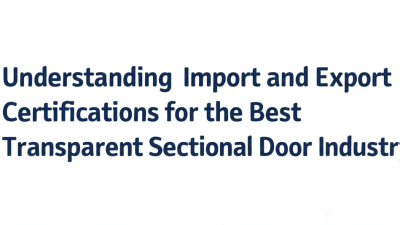In the rapidly evolving landscape of the Industrial Door industry, understanding the intricacies of import and export certifications has become paramount, especially for products like the Transparent Sectional Door. As an essential component in various commercial and industrial applications, these doors not only offer aesthetic appeal but also enhance functionality and energy efficiency. At Guangzhou Victorydoor Co., Ltd., a pioneer in the manufacturing and installation of industrial doors since 2005, we are committed to navigating the complexities of trade regulations to ensure that our offerings, including thermal insulation rolling shutter doors and security fast doors, meet international standards. This blog will explore the key import and export certifications relevant to the Transparent Sectional Door industry, highlighting their importance in fostering transparency and trust in global trade, and ensuring that our customers receive top-quality products that adhere to safety and performance benchmarks.

Key Certifications Essential for the Sectional Door Industry
In the competitive landscape of the sectional door industry, understanding key certifications is essential for manufacturers and distributors seeking to ensure product quality and compliance. Various certifications, such as the International Organization for Standardization (ISO) and the American National Standards Institute (ANSI) guidelines, serve as benchmarks that help maintain high standards in safety, durability, and performance. According to recent industry reports, adherence to these standards can increase customer trust by up to 50%, culminating in better sales and market reputation for businesses.
Tips: When choosing certification bodies, prioritize those recognized in your target markets. Research their requirements thoroughly and ensure your production processes align with these standards to streamline certification acquisition.
Another critical certification is the Underwriters Laboratories (UL) listing, which verifies the safety and performance of sectional doors. ANSI/UL 325 pertains specifically to door operators and ensures they meet rigorous safety tests. Reports indicate that products with UL certification can experience a 30% increase in market visibility, as consumers are increasingly aware of safety concerns.
Tips: Regularly update your knowledge of certification processes, as regulations may change. This proactive approach will help you stay ahead of compliance and maintain your competitive edge in the industry.
Navigating Regulatory Standards for Import and Export
Navigating the complex landscape of regulatory standards for import and export is essential for companies engaged in the transparent sectional door industry. As global trade continues to evolve, businesses must ensure compliance with various certifications and regulations that govern the quality and safety of their products. Understanding these requirements is crucial for maintaining a competitive edge and fostering trust with both customers and international partners.
One fundamental aspect of navigating these regulatory standards involves familiarizing oneself with the specific certifications required for different markets. This includes knowing which organizations issue the certifications, the criteria for compliance, and the documentation needed to validate product standards. By ensuring that products meet these regulatory mandates, companies not only enhance their marketability but also mitigate risks associated with potential legal issues and product recalls. Furthermore, staying updated on changing regulations is imperative, as non-compliance can lead to significant financial losses and reputational damage in the fast-paced global market.
Impact of Certifications on Product Quality and Safety
In the competitive landscape of the sectional door industry, understanding import and export certifications is crucial for ensuring product quality and safety. Certifications serve as a benchmark for manufacturers, instilling confidence both in consumers and regulators. By meeting stringent quality standards, companies not only enhance their reputation but also comply with international trade regulations, facilitating smoother market entry and expanded distribution channels.
Furthermore, the impact of these certifications extends beyond just compliance; they play a significant role in improving product performance. For example, products that are certified for thermal insulation or security specifications often gain a competitive edge, translating to increased consumer trust.
As the market evolves, stakeholders must prioritize adherence to local and international certification requirements, ensuring that their offerings meet the highest quality and safety standards. This not only protects consumers but also fortifies the industry's credibility in a rapidly globalizing economy.
Trends in Technology Influencing Certification Processes
The advancement of technology is reshaping the certification processes within the import and export sector, particularly in the transparent sectional door industry. Increasingly, manufacturers like Guangzhou Victorydoor Co., Ltd., which specializes in industrial doors including thermal insulation rolling shutter doors and security fast doors, are leveraging innovative technologies such as AI and IoT to streamline compliance with certification standards. According to a recent report by MarketsandMarkets, the global market for industrial doors is projected to grow at a CAGR of 6.5% from 2021 to 2026, highlighting the increasing importance of maintaining high standards in production and certification.
Additionally, automation is playing a critical role in ensuring quality assurance and enhancing supply chain transparency. With more stringent regulatory requirements, companies are now investing in sophisticated software solutions that facilitate real-time tracking of certification processes. This not only speeds up the documentation needed for international trade but also significantly reduces the risk of non-compliance. As the market evolves, it is essential for manufacturers like Victorydoor to remain adaptable to technological trends, ensuring that their production processes meet the ever-changing certification protocols that govern the export of their industrial door products.
Trends in Technology Influencing Certification Processes in the Transparent Sectional Door Industry
The Role of Transparency in Global Trade for Doors
In the competitive landscape of the sectional door industry, transparency serves as a crucial pillar for global trade. As companies engage in international markets, clear communication regarding product specifications, certifications, and compliance with standards reassures customers and partners alike. Ensuring that import and export certifications are readily available not only enhances trust but also streamlines the transaction process, leading to greater customer satisfaction.
Tips for Ensuring Transparency in Trade:
- Maintain up-to-date documentation: Keep your product certifications and compliance documents current. Regular audits can help identify any gaps and foster confidence in your business practices.
- Foster open communication: Encourage dialogue with partners and customers about your processes. Transparency about sourcing and manufacturing can bolster relationships and loyalty.
- Utilize technology: Leverage platforms that offer real-time tracking and updates on shipments, ensuring that all parties are informed throughout the trade process.
By prioritizing transparency, companies can position themselves favorably in the global market, paving the way for better partnerships and increased sales in the sectional door industry.
Future Challenges and Opportunities for Certification in 2025
As we look toward 2025, the landscape of import and export certifications within the transparent sectional door industry presents a unique blend of challenges and opportunities. According to the Global Market Insights report, the sectional door market is projected to reach $9.5 billion by 2025, driven by increasing demand for energy-efficient and secure building solutions. This surge necessitates rigorous certification processes to ensure compliance with international standards, especially as regulations evolve to prioritize sustainability and safety.
Moreover, the shift towards digital certification systems is gaining momentum. A recent study by the International Trade Administration highlighted that incorporating digital solutions could reduce certification processing times by up to 30%. This advancement not only streamlines operations for manufacturers but also enhances transparency, providing consumers with greater confidence in their purchases. However, companies must prepare for the ongoing regulatory changes and invest in training their workforce to adapt to new protocols effectively. Embracing these changes could position firms for growth in a competitive market where certification compliance becomes a key differentiator.
Enhancing Warehouse Efficiency with Good Quality Industrial Lifting Doors: Key Features and Benefits
Industrial Lifting Doors are crucial in enhancing warehouse efficiency due to their design and functionality, which directly addresses the operational needs of industrial environments. These robust door systems not only provide a reliable access point but also optimize space within the facility. According to a recent industry report by the International Door Association, over 30% of warehouse space is wasted due to inefficient door systems. With industrial lifting doors, the panels either slide up under the ceiling or park vertically against the wall, thus freeing up valuable floor space for storage or movement of goods.
Moreover, the sealing performance of these doors plays a significant role in maintaining the internal environment of the warehouse. Effective sealing reduces energy loss and minimizes exposure to external elements, thereby lowering heating and cooling costs by up to 20%, as highlighted in a study by the American Society of Heating, Refrigerating and Air-Conditioning Engineers (ASHRAE). The safety features integrated into industrial lifting doors further enhance their appeal, making them not only a practical solution but also a secure one. Facilities that invest in high-quality industrial lifting doors are likely to experience smoother operations, enhanced safety measures, and overall improved efficiency in their warehousing activities.
